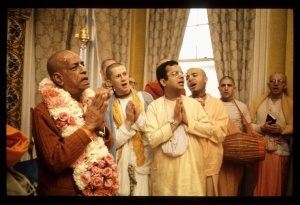CC Adi 7.85: Difference between revisions
m (1 revision(s)) |
(Vanibot #0054 edit - transform synonyms into clickable links, which search similar occurrences) |
||
| (One intermediate revision by one other user not shown) | |||
| Line 1: | Line 1: | ||
{{ | [[Category:Sri Caitanya-caritamrta - Adi-lila Chapter 07|C085]] | ||
<div style="float:left">'''[[Sri Caitanya-caritamrta|Śrī Caitanya-caritāmṛta]] - [[CC Adi|Ādi-līlā]] - [[CC Adi 7|Chapter 7: Lord Caitanya in Five Features]]'''</div> | |||
<div style="float:right">[[File:Go-previous.png|link=CC Adi 7.84|Ādi-līlā 7.84]] '''[[CC Adi 7.84|Ādi-līlā 7.84]] - [[CC Adi 7.86|Ādi-līlā 7.86]]''' [[File:Go-next.png|link=CC Adi 7.86|Ādi-līlā 7.86]]</div> | |||
{{CompareVersions|CC|Adi 7.85|CC 1975|CC 1996}} | |||
{{RandomImage}} | |||
==== TEXT 85 ==== | ==== TEXT 85 ==== | ||
<div | <div class="verse"> | ||
pañcama puruṣārtha—premānandāmṛta-sindhu | :pañcama puruṣārtha—premānandāmṛta-sindhu | ||
mokṣādi ānanda yāra nahe eka bindu | :mokṣādi ānanda yāra nahe eka bindu | ||
</div> | </div> | ||
| Line 12: | Line 16: | ||
==== SYNONYMS ==== | ==== SYNONYMS ==== | ||
<div | <div class="synonyms"> | ||
''[//vanipedia.org/wiki/Special:VaniSearch?s=pañcama&tab=syno_o&ds=1 pañcama]'' — fifth; ''[//vanipedia.org/wiki/Special:VaniSearch?s=puruṣa&tab=syno_o&ds=1 puruṣa]-[//vanipedia.org/wiki/Special:VaniSearch?s=artha&tab=syno_o&ds=1 artha]'' — goal of life; ''[//vanipedia.org/wiki/Special:VaniSearch?s=prema&tab=syno_o&ds=1 prema]-[//vanipedia.org/wiki/Special:VaniSearch?s=ānanda&tab=syno_o&ds=1 ānanda]'' — the spiritual bliss of love of Godhead; ''[//vanipedia.org/wiki/Special:VaniSearch?s=amṛta&tab=syno_o&ds=1 amṛta]'' — eternal; ''[//vanipedia.org/wiki/Special:VaniSearch?s=sindhu&tab=syno_o&ds=1 sindhu]'' — ocean; ''[//vanipedia.org/wiki/Special:VaniSearch?s=mokṣa&tab=syno_o&ds=1 mokṣa]-[//vanipedia.org/wiki/Special:VaniSearch?s=ādi&tab=syno_o&ds=1 ādi]'' — liberation and other principles of religiosity; ''[//vanipedia.org/wiki/Special:VaniSearch?s=ānanda&tab=syno_o&ds=1 ānanda]'' — pleasures derived from them; ''[//vanipedia.org/wiki/Special:VaniSearch?s=yāra&tab=syno_o&ds=1 yāra]'' — whose; ''[//vanipedia.org/wiki/Special:VaniSearch?s=nahe&tab=syno_o&ds=1 nahe]'' — never comparable; ''[//vanipedia.org/wiki/Special:VaniSearch?s=eka&tab=syno_o&ds=1 eka]'' — one; ''[//vanipedia.org/wiki/Special:VaniSearch?s=bindu&tab=syno_o&ds=1 bindu]'' — drop. | |||
</div> | </div> | ||
| Line 19: | Line 23: | ||
==== TRANSLATION ==== | ==== TRANSLATION ==== | ||
<div | <div class="translation"> | ||
“‘For a devotee who has actually developed bhāva, the pleasure derived from dharma, artha, kāma and mokṣa appears like a drop in the presence of the sea. | “‘For a devotee who has actually developed bhāva, the pleasure derived from dharma, artha, kāma and mokṣa appears like a drop in the presence of the sea. | ||
</div> | </div> | ||
__NOTOC__ | |||
<div style="float:right; clear:both;">[[File:Go-previous.png|link=CC Adi 7.84|Ādi-līlā 7.84]] '''[[CC Adi 7.84|Ādi-līlā 7.84]] - [[CC Adi 7.86|Ādi-līlā 7.86]]''' [[File:Go-next.png|link=CC Adi 7.86|Ādi-līlā 7.86]]</div> | |||
__NOTOC__ | |||
__NOEDITSECTION__ | |||
Latest revision as of 19:18, 19 February 2024

His Divine Grace
A.C. Bhaktivedanta Swami Prabhupada
A.C. Bhaktivedanta Swami Prabhupada
TEXT 85
- pañcama puruṣārtha—premānandāmṛta-sindhu
- mokṣādi ānanda yāra nahe eka bindu
SYNONYMS
pañcama — fifth; puruṣa-artha — goal of life; prema-ānanda — the spiritual bliss of love of Godhead; amṛta — eternal; sindhu — ocean; mokṣa-ādi — liberation and other principles of religiosity; ānanda — pleasures derived from them; yāra — whose; nahe — never comparable; eka — one; bindu — drop.
TRANSLATION
“‘For a devotee who has actually developed bhāva, the pleasure derived from dharma, artha, kāma and mokṣa appears like a drop in the presence of the sea.